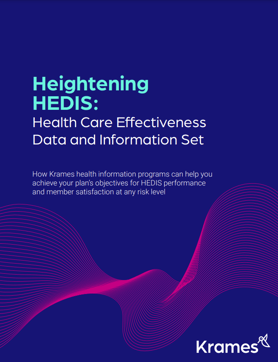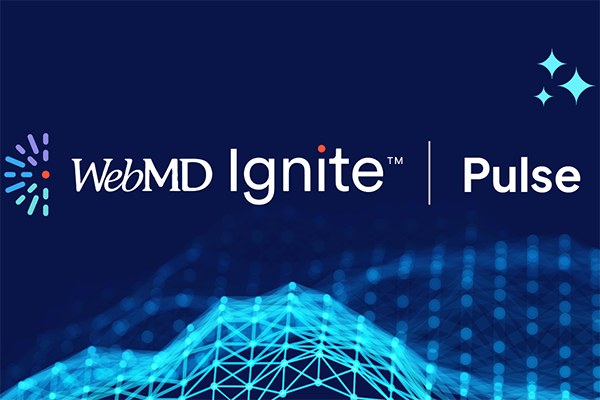From health plan performance data to supporting individual members: Krames partnerships can help raise HEDIS scores and member satisfaction
Categories: health plans
Tags: Build loyalty
Editor's Note: This blog was published prior to the transition to WebMD Ignite.
About 191 million individuals are enrolled in health plans that use the Healthcare Effectiveness Data and Information Set (HEDIS) as their most important tool in evaluating plan quality and clinical performance. HEDIS is administered by the National Committee for Quality Assurance (NCQA), which collects the data and evolves the HEDIS measurement set annually. HEDIS matters, as NCQA plan accreditation is based on HEDIS results combined with Consumer Assessment of Healthcare Providers and Systems (CAHPS) measures, and for Medicare plans, CMS’ Health Outcomes Survey (HOS).
Raising or maintaining scores in the measures within these eight HEDIS domains is a priority among the managers, marketers, and executives of the over 90% of plans that use HEDIS annually for measuring their performance.
So how do you improve HEDIS scores?
Raising HEDIS scores typically involves improving member experience, risk management, and outcomes while lowering the cost of care. Plans can’t attain these objectives without engaging their members. One approach that plans have taken is to actively work with their high and rising risk members in care management programs so that they become more proactive in adopting behaviors that can influence their overall health. These can be as significant as making and keeping required medical appointments, taking medications as prescribed, getting regular diagnostic screenings, improving nutrition choices, and reducing stress. This type of proactivity requires increased self-awareness, self-management, and a willingness to adopt long-term healthy habits.
Unfortunately, you can’t simply instruct members to become proactive and self-aware to get the results you want. You can, however, motivate members toward consumer empowered health through targeted coaching sessions, supported by educational content that extends and reinforces member understanding of their condition and recovery.
Krames produces a range of evidence-based, culturally appropriate educational materials in practical formats that promote health understanding. They teach members and their families how to be more effective in managing chronic conditions. High and rising risk members can particularly benefit from care managers who coach in sessions backed up by Krames management tools and materials.
Ignite On-Demand® and Care ConnectorTM
Ignite On-Demand and Care Connector are two products ideally suited to support 1:1 care management and member-centric health.
Educational materials available through these platforms include:
- 4,000 printable HealthSheets™ in 43 areas
- Over 1,500 HealthClips® videos in 23 areas
- Medication Sheets on 4,500 medications, covering 99% of the most frequently prescribed drugs
Ignite On-Demand and Care Connector are intuitive platforms that can be seamlessly integrated into patient care workflow, allowing care managers to pre-organize materials before counseling, then send paper or virtual packages of appropriate condition, procedure, and medication materials to managed members. This content deepens the educational experience during counseling sessions, improves retention afterward, personalizes the experience, and provides easily accessible resources that encourages the member to actively engage with managing their medical condition.
Ignite On-Demand and Care Connector support key measures within the HEDIS domains of Effectiveness of Care, Access/Availability of Care, Experience of Care, Utilization and Risk-Adjusted Utilization, Measures Collected Through the Medicare Health Outcomes Survey, and Measures Collected Through the CAHPS Survey.
Ignite On-Demand and Care Connector in action
To understand the benefits a health plan can obtain from using Ignite educational tools and information, imagine a scenario involving a plan member named Nadine who has Type 2 diabetes. At age 67, she’s recently retired and enjoys traveling with her husband.
- Using Ignite On-Demand or Care Connector, a plan Care Manager reviews Nadine’s records before their counseling meeting. She selects HealthSheets appropriate to Nadine’s diagnosis, Medication Sheets on Nadine’s prescriptions, and two videos for patients newly diagnosed with Type 2 diabetes.
- During the online session, Nadine and her Care Manager talk about necessary disease management steps, such as Nadine self-checking her blood glucose, regular checkups with her primary care physician, getting her kidney function tested, and seeing an eye doctor for an exam that includes a retinal check.
- Then they watch the video together, which leads Nadine to confess how upsetting her diabetes diagnosis has been and how much sadness she’s felt since. She enjoys food and loves to cook and feed her family during get-togethers. She is also confused about nutrition dos and don’ts and wants advice on meal planning.
- The Care Manager uses the HealthSheets she identified in advance to facilitate a discussion of Nadine’s current diet and some simple adjustments in food and activity that will improve her HbA1c. She also lets her know she can send Nadine meal planning resources to consult at home so she can learn more and that reviews what they discussed today.
- Using Care Connector, the Care Manager sends Nadine to her Member Portal with content they discussed during the session for her future reference. With Ignite On-Demand, she emails PDFs and online links to the material. She also tells Nadine that she will send her a Go-to-Guide to reinforce their discussion on checking her blood sugar, incorporating physical activities, diet and meal planning, boosting emotional health, and healthfully handling everyday situations such as family gatherings.
With the Care Manager’s personalized approach to coaching, and the actionable information she sent for Nadine to consult during and after her counseling session, Nadine is inspired to actively participate in her chronic disease management, and so is her family. In her next session, Nadine reports joining a support group sponsored by her doctor and walking four times a week. Her sense of control over her diabetes has increased, along with her emotional well-being and satisfaction with her health plan.
By using the same approach with other high and rising risk members, care managers can observe clinical outcomes and quality of life improving on a large scale. These improvements can generate the kind of overall member satisfaction that can improve a plan’s performance in HEDIS domains that include CAHPS member experience, and Medicare survey measures.

Read more about Ignite's approach to health education and how it can influence plan HEDIS scores in our white paper, Heightening HEDIS: How Krames health information programs can help you achieve your plan’s objectives.
Learn more about Krames and our complete suite of care management and member wellness programs at https://www.krames.com/health-plans. Across the entire health journey, Krames is here to activate health with empowering content, engaging education and marketing, and intelligent, integrated clinical workflow solutions. To learn more, visit krames.com or connect with us on LinkedIn, Twitter, and Facebook.




